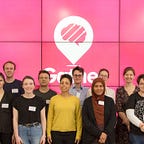Data Literacy and Accessibility
From online shopping to phone maps, we talk about data unknowingly throughout our days. This is particularly evident with the graphs and statistics given to us daily about the COVID-19 pandemic. It’s clear that we live in a data-rich world. But how many people actually understand the data that affects us?
Data literacy can be defined as people’s ability to read, write and communicate data, as stated by Gartner. It’s not just being able to read and write data, but the focus on communicating data is significant. As Tech Target asserts, much like literacy of any written information, people should understand what the data about themselves mean. One of the core values of social justice is access. Typically, this means access to social services such as healthcare and education. In our data-rich world, this has to include access to tools and resources that help us understand data. The majority of the searches on data literacy focuses on organisations and companies, rather than the general public. It is important that the average person should be able to gain data literacy skills.
Nevertheless, it is important to point out that there are categories and limitations to accessing training to improve data literacy. Within our work at Gather, notably our Benchmark Initiative project, we found it hard to define the categories for data literacy. For example, who can be data literate? Researchers Alan Freihof Tygel and Rosana Kirsch emphasise that there are categories that impact who can be data literate. For instance, they highlight that data literacy is mainly for people who are already literate in reading and writing. They bring up another significant point — data literacy also depends on access to a computer, mobile or other technological devices. That is why it is important to focus on overcoming technological barriers, in order to focus on accessibility to data literacy. In today’s Zoom world, there are still communities left behind, without access to the internet and computers.
Who is doing work on data literacy?
There are various organisations and projects that contribute to the data literacy conversation that we want to put the spotlight on.
This is a research space which examines the relationship between datafication and social justice within society, especially within the politics of data. They provide a thorough guidebook on data literacy, which is created for a wide range of people — communities, teachers and non-experts. This is important to highlight as many organisations tend to focus on data literacy for people within organisations and companies.
This project was launched by data analytics company, Qlik. It was designed to continue the conversation and help people access data literacy skills. The Data Literacy Project provides a number of courses for free –from data analytics to data storytelling.
The Centre for Humanitarian Data focus specifically on data within the humanitarian sector. They focus on increasing data literacy among non-technical and technical humanitarians, through providing training materials on subjects such as visualising data.
Do you know anyone else who is championing data literacy? Share it with us and continue the conversation on #dataliteracy. Keep up with Gather’s work on our Twitter, Linkedin and our website.
